An app that aims to help individuals on their journey to recovery by providing seamless access to personalized physical therapy.
Recovering from injuries or managing chronic pain can be challenging, requiring personalized care and consistent guidance. Evolutio aims to support patients by offering an all-in-one platform for booking appointments, tracking progress, and staying connected with therapists, ensuring a smoother and more effective rehabilitation process.
Jump to the Main Screens or Design System.

OVERVIEW
I was the Team Lead, and my individual contributions involved drafting research objectives & questions, heuristic analysis, information architecture, presenting prototypes and design decisions regularly to leadership, and delivering final assets for production.
As part of the team, I was responsible for User Research (Qualitative & Quantitative Data Mapping & Analysis), Wireframing, Prototyping, Usability Testing, User Interface Design.
PROJECT SPECS
Role: Lead Product Designer
Duration: August 2024 - September 2024
Platform: Mobile (iOS)
Team: 4 Designers, 1 Program Manager, Founder
Tools: Figma, Miro, Notion, Adobe Photoshop, Adobe Illustrator, Microsoft Office
KEY HIGHLIGHTS
15%
Increase in engagement with prescribed exercises.
20%
Decrease in user reported confusion.
25%
Increase in successful first-attempt bookings.
30%
Reduction in onboarding time.
CHALLENGE
Imagine trying to book a much-needed physical therapy session, only to face endless hurdles—confusing interfaces, unavailable slots, and a lack of clarity about your progress. This was the reality for users of Evolutio, a physical therapy app that struggled to provide a seamless experience.
Users found it difficult to schedule appointments, leading to frequent no-shows and cancellations. Without personalized content, progress tracking, or effective communication tools, many felt unsupported in managing their therapy journeys, ultimately falling short of their health goals.
Appointment Scheduling
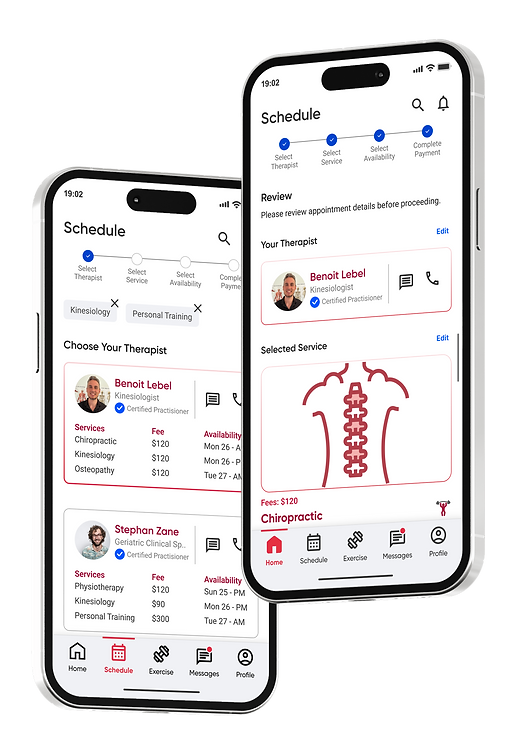
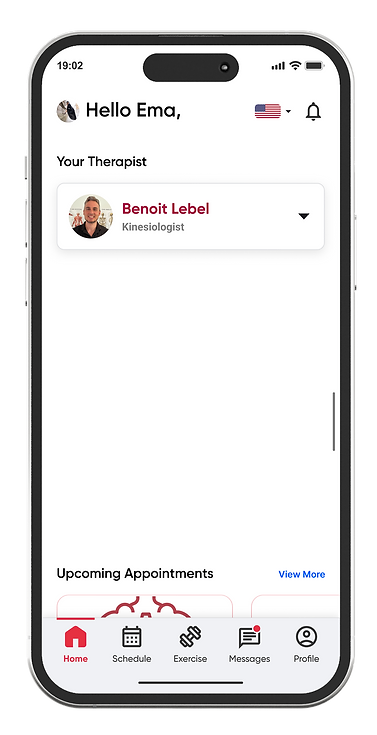

Progress Tracking
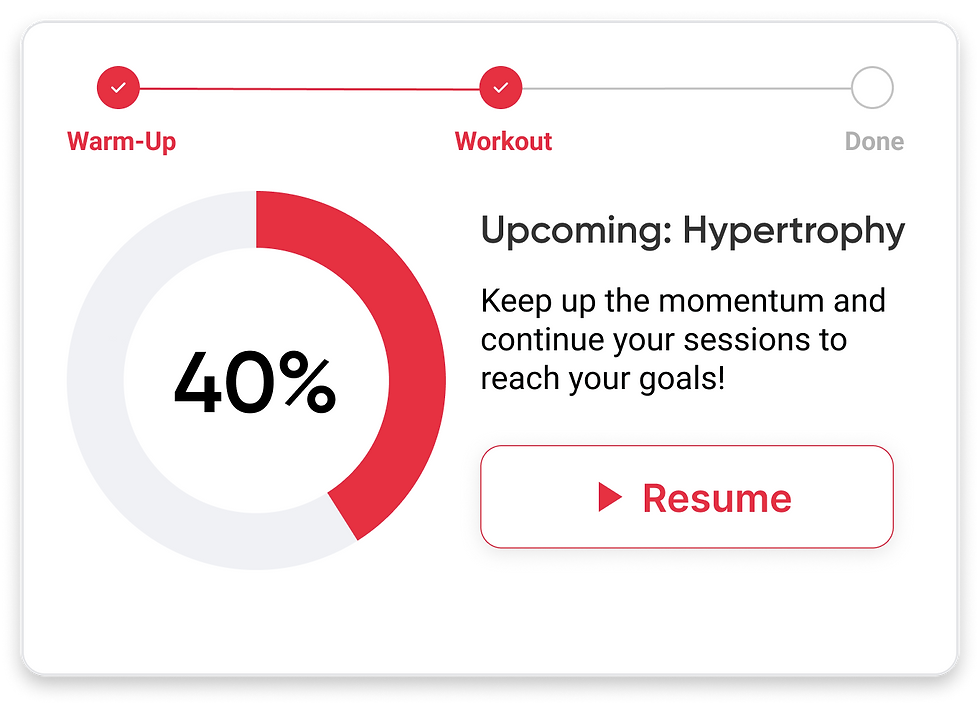
Personalized Content
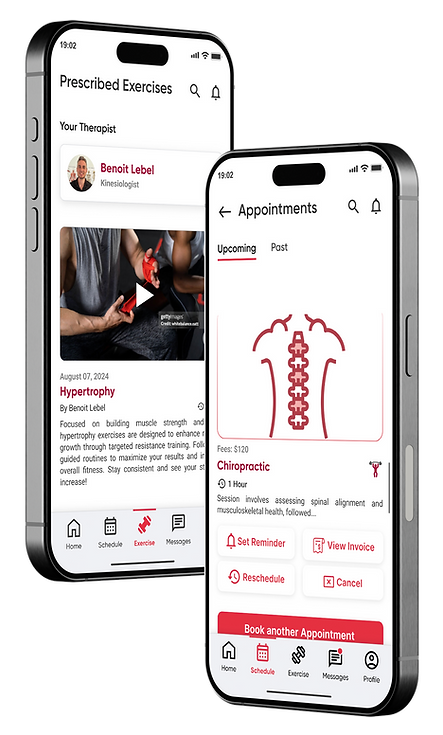
APPROACH
Evolutio redefined the therapy experience by introducing thoughtful, user-focused solutions to address these pain points:
-
Effortless Appointment Scheduling:
A streamlined system featuring real-time therapist availability, automated reminders, and easy online booking—minimizing no-shows and boosting operational efficiency. -
Personalized Support and Progress Tracking:
Custom content tailored to users’ needs, tools to monitor therapy progress, and enhanced communication channels between users and therapists—all designed to foster engagement, satisfaction, and better health outcomes.
Explore the Main Screens and accompanying Design System.

Research Objectives
Identify missing core features to improve functionality and competitiveness.
Enhance the overall user experience and streamline the booking process for physical therapy appointments.
Assess and improve live exercise video usability and engagement.
Optimize user satisfaction, retention, and communication features between users and therapists.
Affinity Mapping

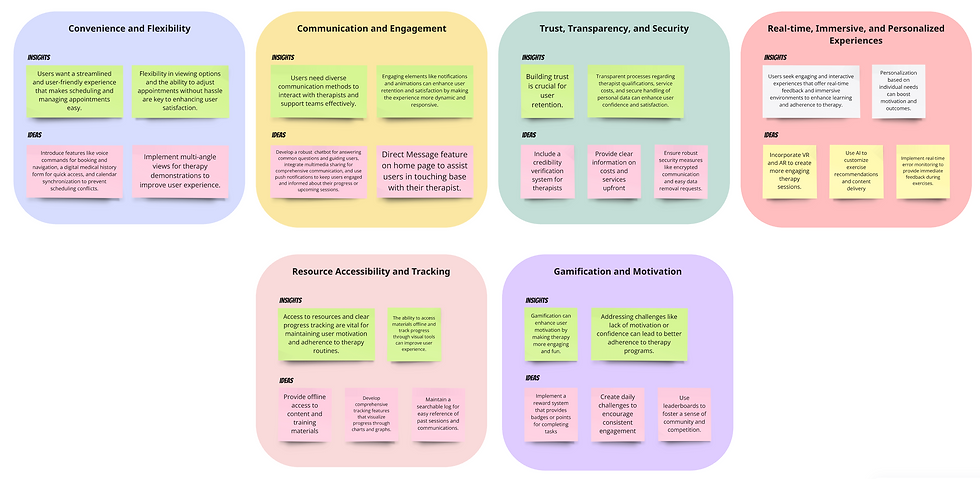
DESIGN SYSTEM





LOW FIDELITY WIREFRAMES
During the ideation process, I identified key user flows and developed low-fidelity wireframes to rapidly explore and generate design ideas.
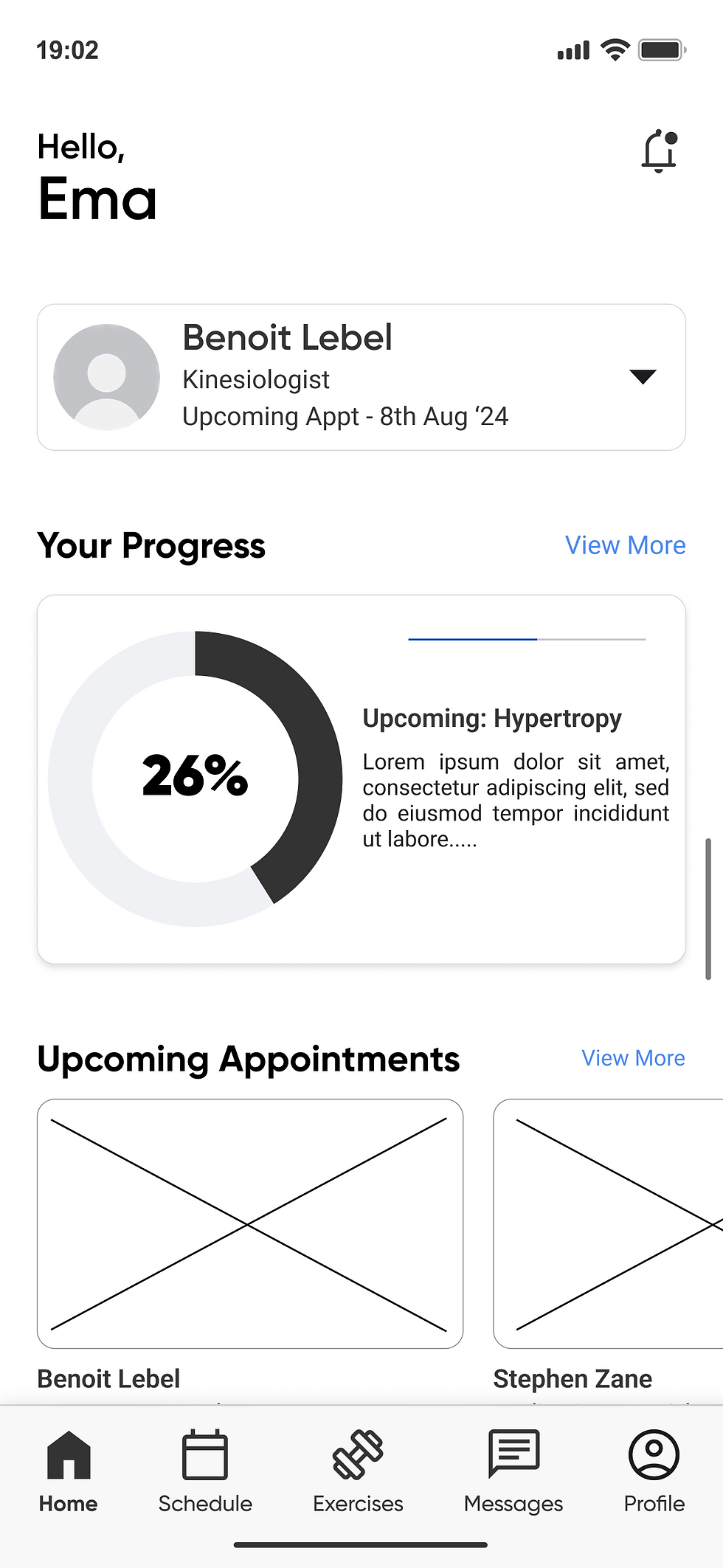



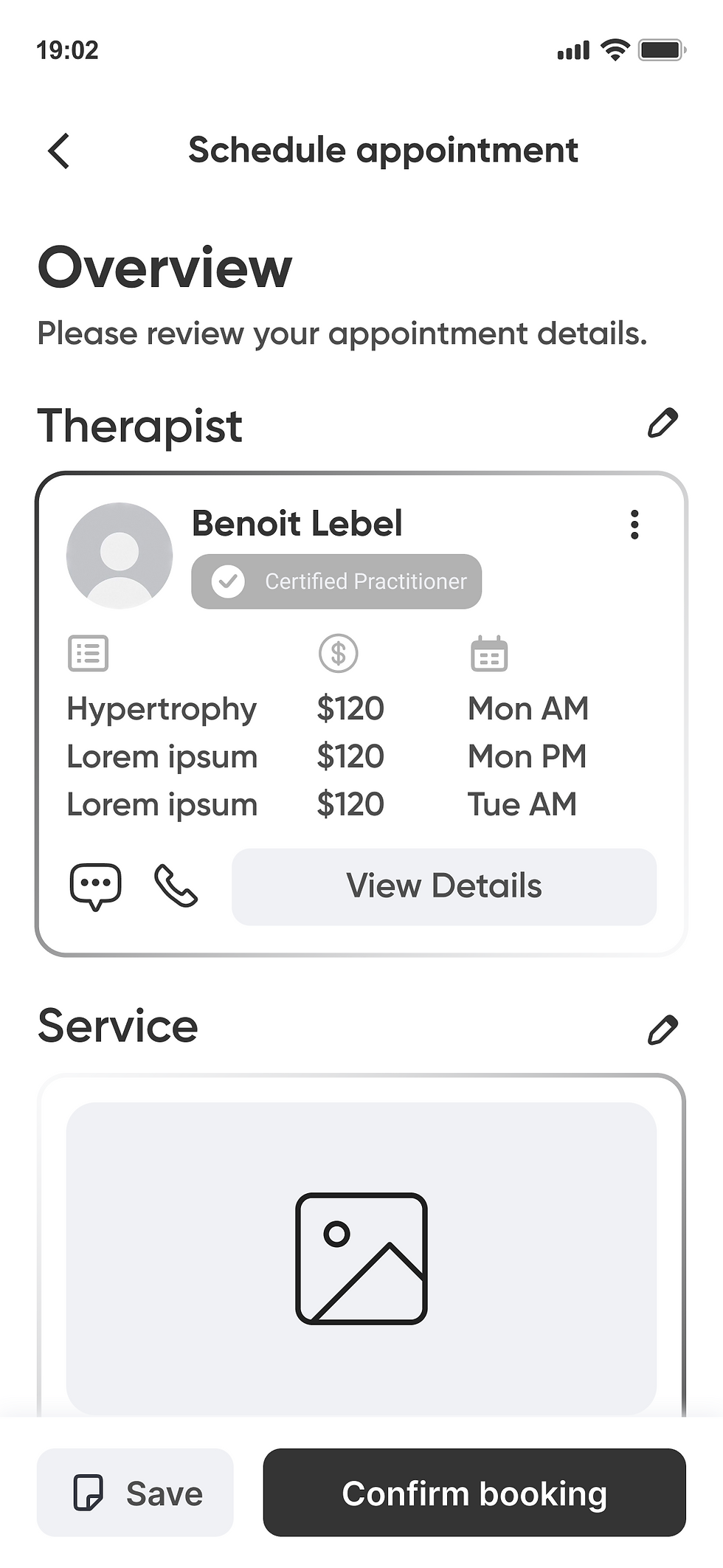

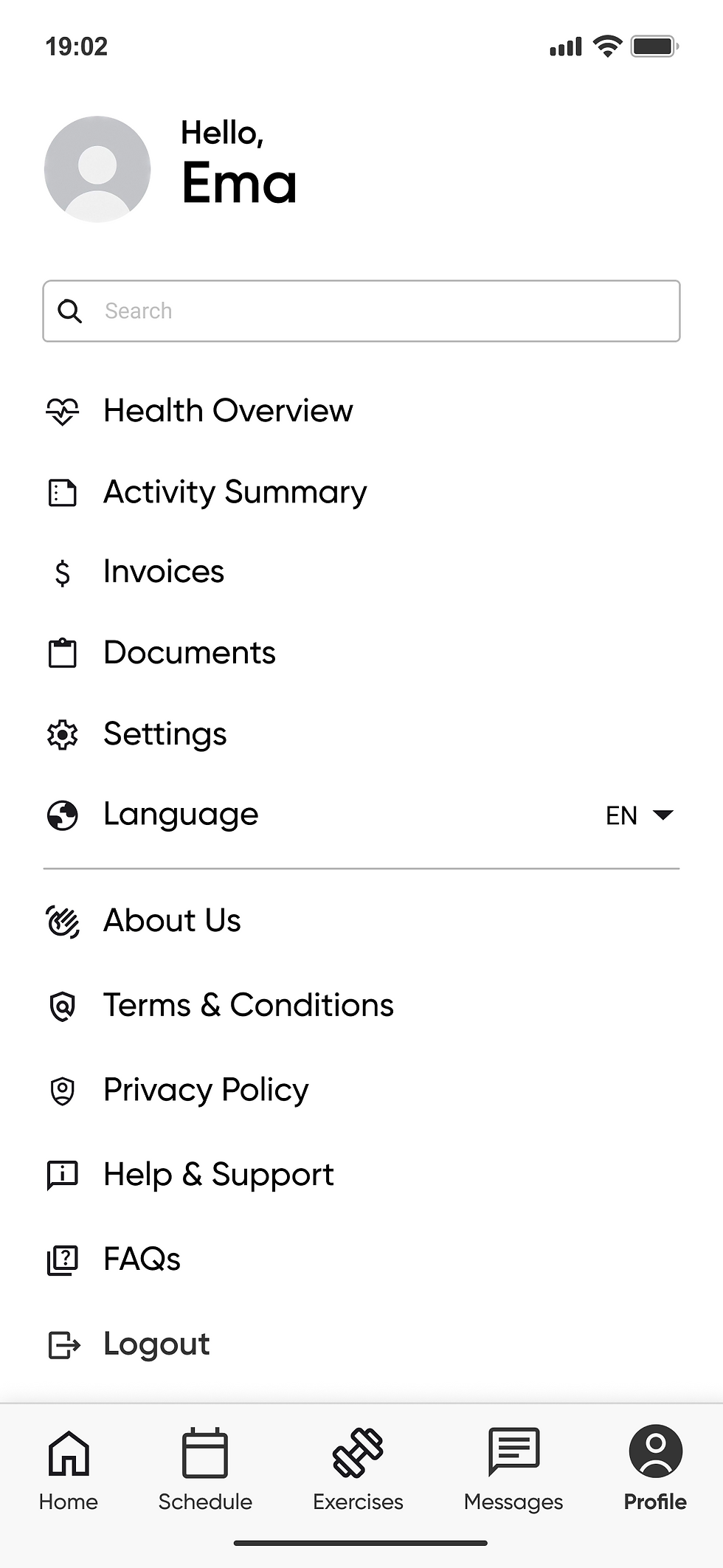
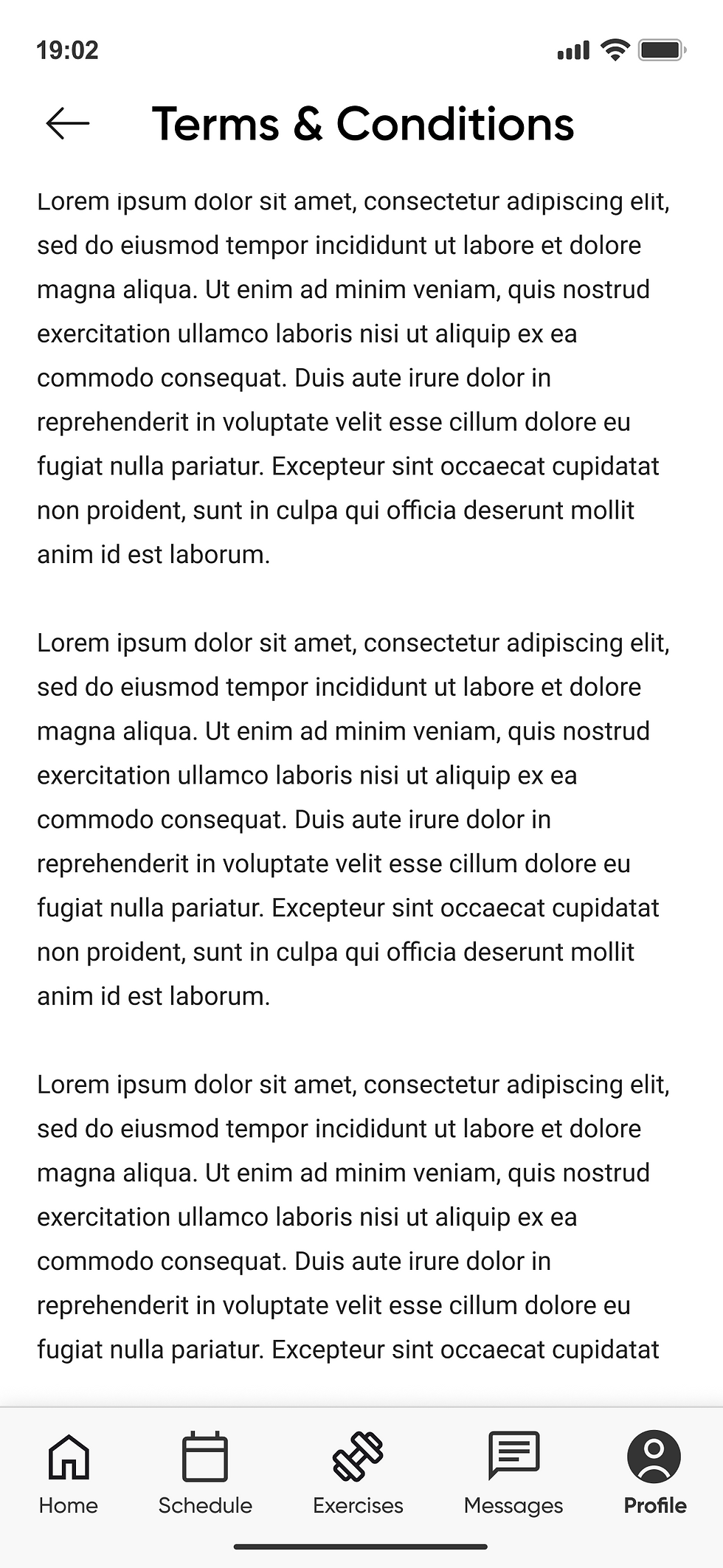




USABILITY TESTING 1
The initial experience wasn’t seamless. The first iteration underwent usability testing, which revealed several pain points and areas for improvement.
Testing MVP
Conducting a Moderated user testing with 4 participants, the following tasks were assigned -
-
Navigating from Onboarding Screen to Home Screen.
-
Exploring the Home Screen & Navigating to Prescribed exercises.
-
Scheduling Appointments with the Therapists.
-
Networking with therapists.
-
General Feedback on App Usability.
Results
-
The task completion rate was recorded at 80%, indicating that a majority of users were able to successfully complete the task.
-
The average difficulty rating was 3.5 on a scale of 1 (least difficult) to 5 (most difficult), suggesting a moderate level of challenge for users.
-
Additionally, the average number of errors per user was 3, highlighting some areas where users encountered issues during the process.





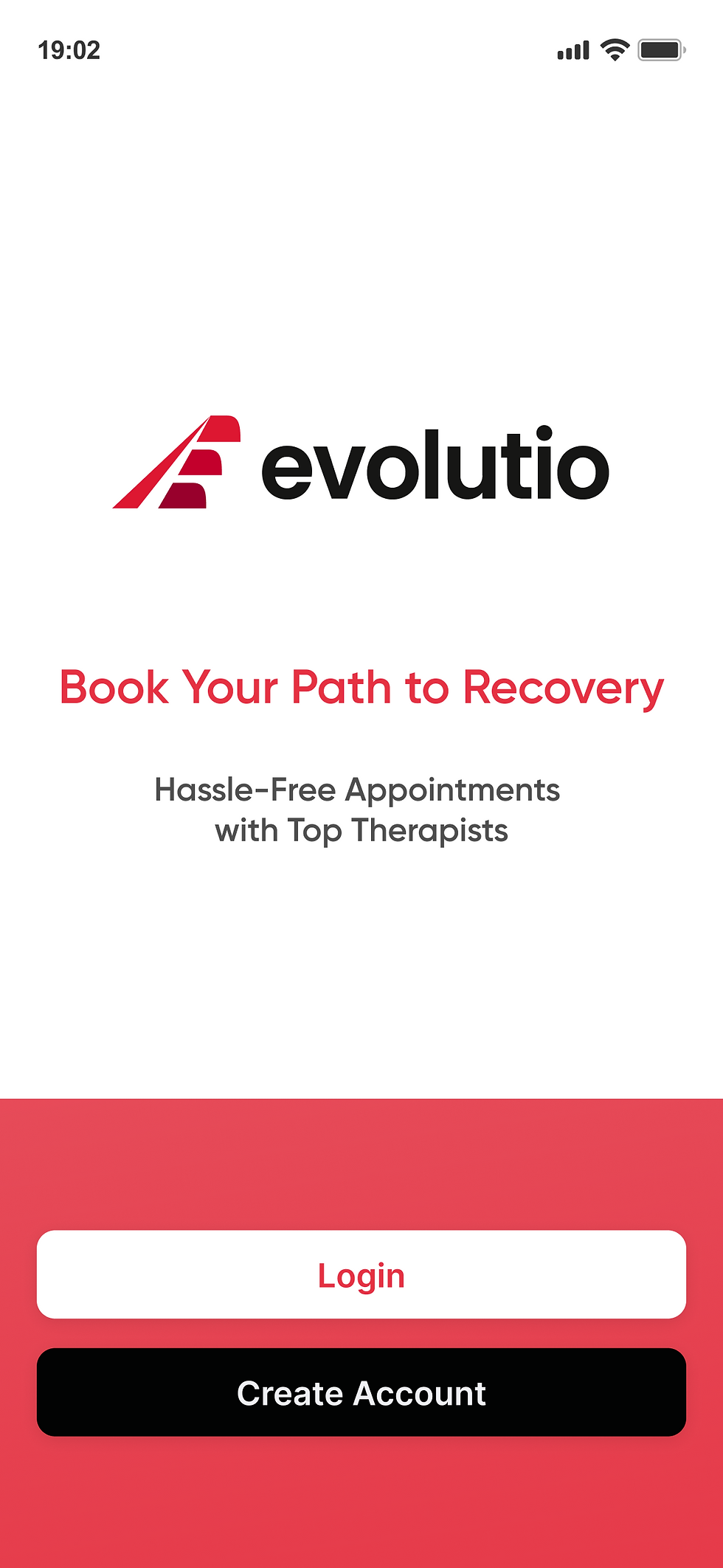







MAIN SCREENS
Creating the high-fidelity wireframes involved incorporating brand elements into the low-fidelity wireframes, guided by design thinking principles.
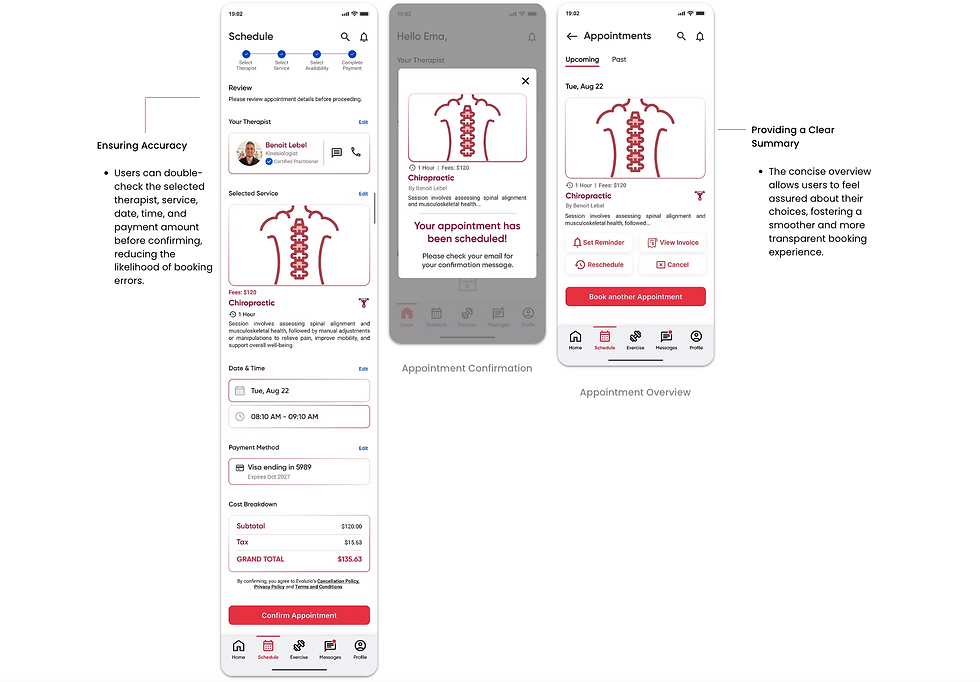



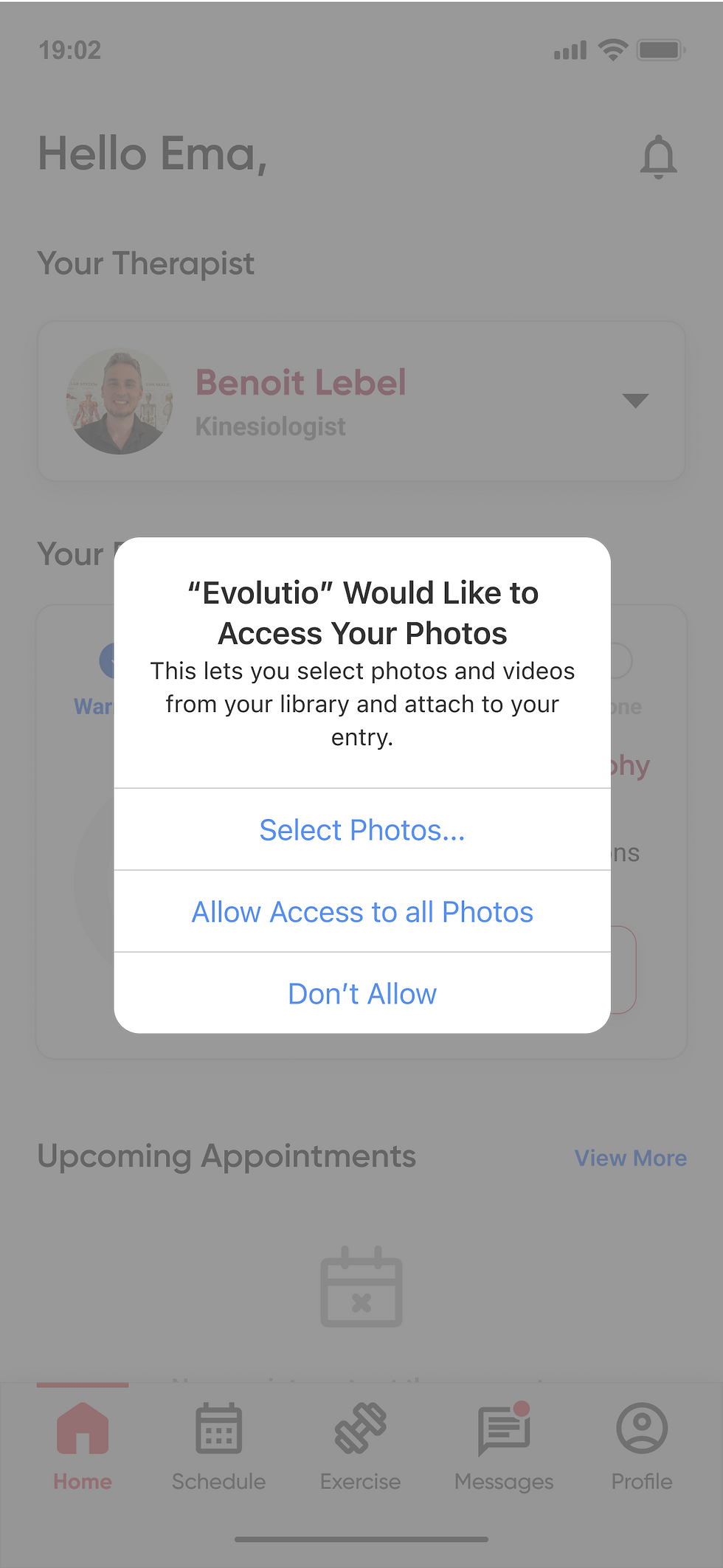





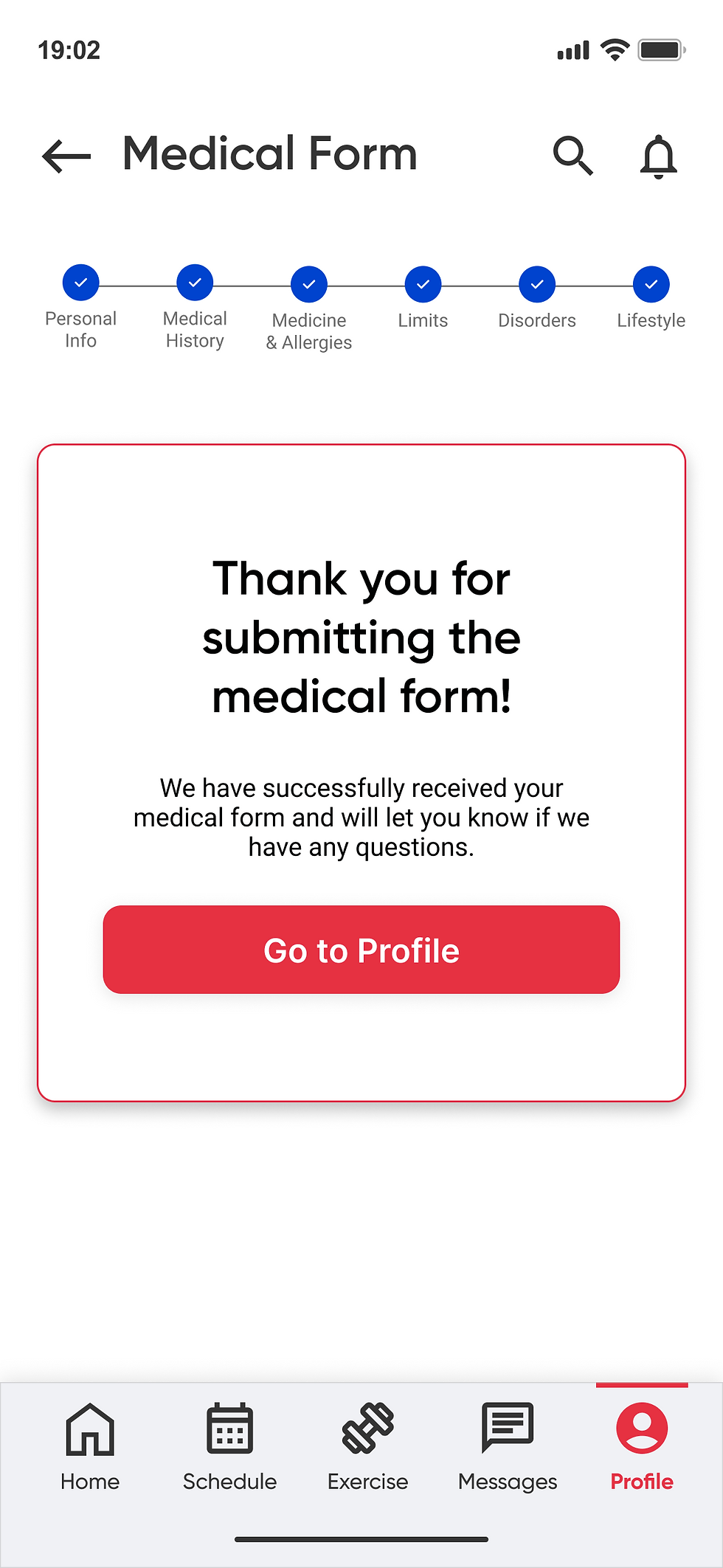


USABILITY TESTING 2
The initial experience wasn’t seamless. The first iteration underwent usability testing, which revealed several pain points and areas for improvement.
Testing MVP
Conducting a Moderated user testing with 4 participants, the following tasks were assigned
-
Navigating from Onboarding Screen to Home Screen.
-
Exploring the Home Screen & Navigating to Prescribed exercises.
-
Scheduling Appointments with the Therapists.
-
Networking with therapists.
-
Navigating through User Profile, FAQs and other settings.
-
General Feedback on App Usability.
Results
-
The task completion rate stood at 90.9%, indicating a high level of user success in completing the task.
-
The average difficulty rating was 2.0 on a scale from 1 (least difficult) to 5 (most difficult), suggesting that users found the task relatively easy to perform.
-
Furthermore, the average number of errors per user was 1, reflecting minimal usability issues during the interaction.
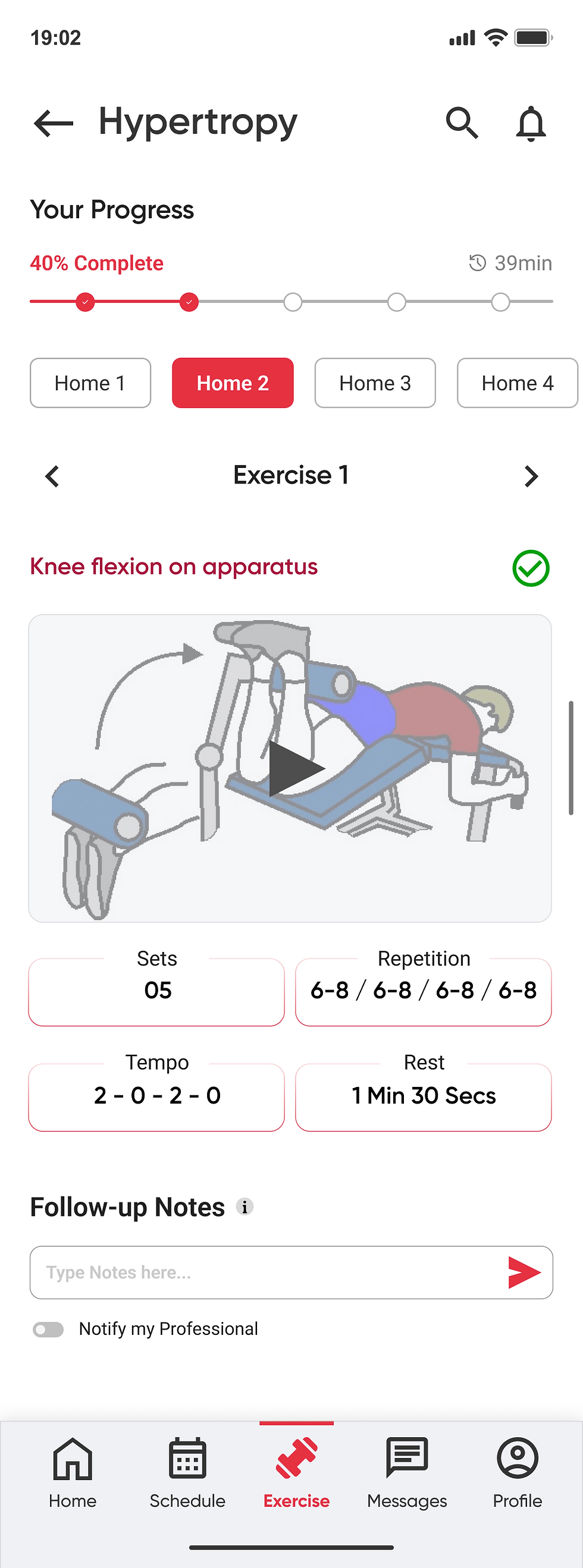
Before
After

4/4 participants had trouble understanding the terminology on the exercise prescription page. The terminology has been revised to more user-friendly language, and an information icon has been added to each section of the exercise to enhance clarity.

Before
After

3/4 participants found the purpose of the therapist card at the top of the page unclear. To improve clarity, a label was added.

Before
After

2/4 participants recommended including the cancellation policy on the appointment booking confirmation page for easier access to the terms. A link to the cancellation policy has been added to the page.
MY LEARNING
Evolutio presents an opportunity for the users and practitioners to connect on a singular platform. Some of the major learnings from the project included:
-
Understanding the importance of incorporating user feedback to enhance key features like scheduling, personalized content, and communication tools, which directly impact user satisfaction and retention.
-
Learning how crucial engagement tools, such as personalized plans and improved therapist communication, work for user adherence to therapy.
-
Recognizing the need for essential features such as real-time therapist availability and progress tracking to streamline the user experience and address pain points.
The Evolutio project has been a valuable journey in understanding the importance of user-centered design, feature prioritization, and the impact of personalized experiences on user engagement and retention. By incorporating real user feedback, the project has laid the foundation for an app that is not only functional but truly responsive to the needs of its users. The next steps will focus on refining these features through usability testing, further optimizing the user experience, and continuously evolving the app to better support users in their therapy journeys. This process reinforces the significance of iterative improvement and adaptability in delivering a successful digital health solution.


